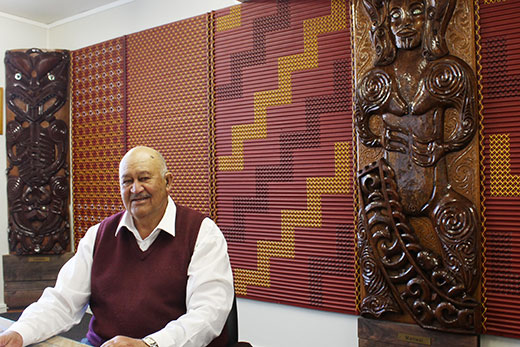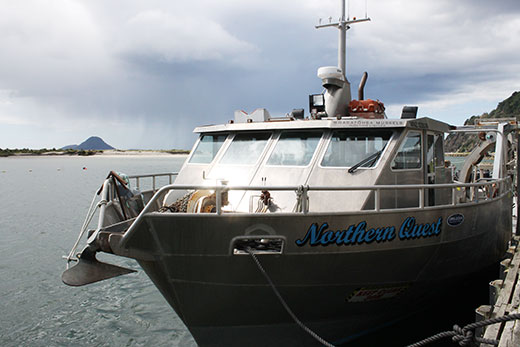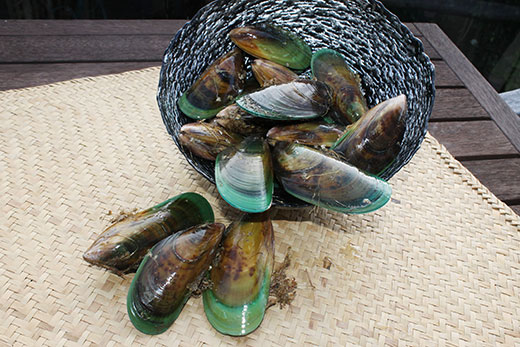Large, succulent ocean-grown mussels harvested from New Zealand’s first offshore farm by Whakatōhea Mussels represent more than a tasty treat – this special kaimoana is set to bring a healthy boost to Opotiki economy, employment and optimism.
The Whakatōhea mussels harvested this October from the Open Ocean Farm, 8.5km offshore from the East Coast community were so popular locals queued in supermarket aisles to buy them.
“Delays in harvesting meant the mussels grew too big for export. We were fortunate to have the opportunity to sell our mussels on the local market,” says Eastern Sea Farms Ltd and Whakatōhea Māori Trust Board chairman Robert Edwards, who is director of Whakatōhea Mussel Ōpōtiki Ltd, a company tasked with operating and developing the mussel Farm.
The first harvest was 30 tonnes, followed by a further 20 tonnes. However, fans of the Whakatōhea mussel must wait a while for their next taste of the delicacy.

Eastern Sea Farms Ltd and Whakatōhea Māori Trust Board chairman Robert Edwards is also director of Whakatōhea Mussel Ōpōtiki Ltd, a company tasked with operating and developing the mussel farm.
“In 2017, WMOL will harvest 12 lines. How we proceed with this crop is still to be decided by WMOL,” says Robert,who was aboard the ‘Northern Quest’ to bless and return to the sea, the first mussels harvested.
Opotiki Mayor John Forbes is among the fans of the mussel, which were distributed and sold in Foodstuffs Ltd stores throughout the North Island under the OPEN OCEAN brand.
“They are big, fat, clean mussels with bright green shells and have a great taste – probably because they are grown in the open ocean,” says John.
Largest farm
The farm is the largest consented water space in New Zealand. Growing mussels in the open ocean at a depth of up to 35 metres has not been done in this country before, and it’s taken 15 years to bring home the first commercial harvest.
The project began in 2001 when the application for consent, to farm the water space, was made. Resource consent was finally granted in 2008 for 20 years, with the right to renewal. So far, research into how to farm offshore has been carried out in conjunction with the Cawthron Institute.
Robert says the challenges of the operation have led to a number of innovations for which the trust has intellectual property rights.
Unlike in-shore mussel farms, Eastern Sea Farms has a limited number of buoys floating on the surface. Instead, some are submerged to reduce the impact of ocean swells. Navigation beacons signal the farm’s location to passing vessels.
“When the buoys sink too low because of the weight of mussels, we send divers down to attach more buoys to hold them at the right level,” says Robert.
Mussel spat
The farm’s operators have also developed unique systems for catching mussel spat, including special spat lines to seed the farm and sell to other operators. So too have they refined the process of harvesting spat and re-seeding the farm’s lines with juvenile mussels.
Robert says the farm has faced numerous obstacles, including gaining consent to farm the waters and raising the required capital. The grounding of the container vessel the Rena on Astrolabe Reef offshore from Tauranga in October 2011 was another spanner in the works. It meant mussels on the farm had to be removed and returned to the sea instead of harvested because of the risk of contamination.
Eastern Seafarms had been reliant on Sanfords to harvest the mussels, but this year WMOL leased, and then purchased, the $2.3 million purpose-built vessel ‘Northern Quest’.
“This has made a huge difference to our operation because we can now harvest and service the farm ourselves. We will be adding extra equipment to the vessel for mussel grading and re-seeding,” says Robert.
Northern Quest
Northern Quest was built by Challenge Marine in Nelson and launched in 2009. It is 29.9m – or 100 feet – long and 8.22 metres – or 30 feet – wide. Two moorings have been installed in the Whakatane Harbour where the Northern Quest will be based until the Opotiki Harbour entrance is opened. The vessel also has a mooring in the Coromandel where it will continue to do contract work when it is not required in the Eastern Bay.

The $2.3 million purpose-built vessel ‘Northern Quest’ currently berths at Whakatane.
Robert says the re-development of the Opotiki Harbour to create all-tide access is crucial to the future of the marine farm and Opotiki economic development.
“The harbour is essential for us to meet our goals.”
Those goals include increasing the yield from the farm and developing a mussel processing plant onshore in Opotiki to provide even more employment.
Our people
“We remain positive and look forward to the mussel farm, the harbour re-development becoming a reality,” says Robert.
In preparing for that eventuality and the increased employment it will bring, training courses are being run to upskill people for a whole new rafts of job opportunities.
“It has been a long road, with many potholes, but our resolve and determination have seen us through to this day. We will be here for generations to come, providing food for the world – as well as other value-added products,” says Robert.
Through marine farming and the harbour development, the trust board will also realise its goal “to grow and invest in the wellbeing of our people”.
“It is all about our people,” says Robert.



0 Comments
Leave a Comment